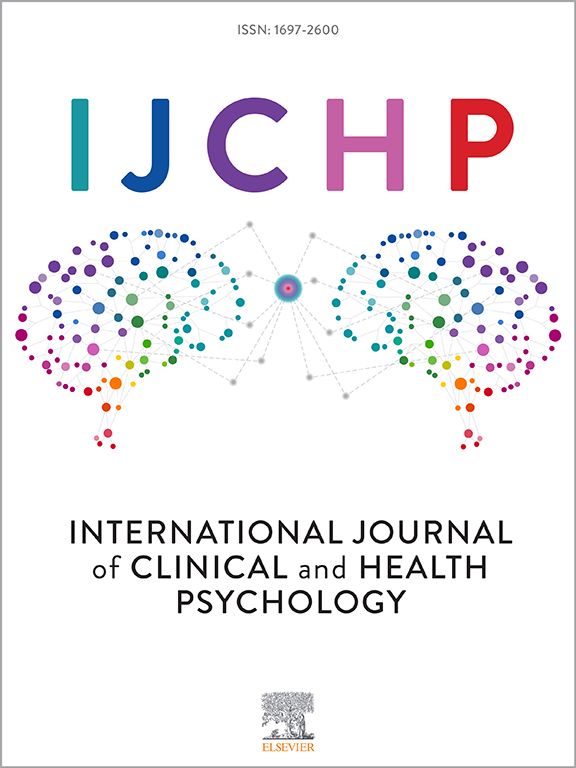Effects of human concurrent aerobic and resistance training on cognitive health: A systematic review with meta-analysis
IF 4.4
1区 心理学
Q1 PSYCHOLOGY, CLINICAL
International Journal of Clinical and Health Psychology
Pub Date : 2025-01-01
DOI:10.1016/j.ijchp.2025.100559
引用次数: 0
Abstract
Background
The rising prevalence of cognitive decline and neurodegenerative diseases, projected to affect 150 million individuals by 2050, highlights the urgent need to enhance neurocognitive health. While both aerobic and resistance training are recognized as effective strategies, their combined effects on cognition remain underexplored.
Objective
This study aimed to determine if concurrent aerobic and resistance training (CT) is effective in enhancing cognitive function.
Methods
Seven English and three Chinese databases were searched from inception to August 2024. Randomised controlled trials (RCTs) examining the effects of CT on global cognition across diverse populations were included. A meta-analysis was performed using a random-effects model in R and Stata, supplemented by subgroup and meta-regression analyses to explore variability.
Results
The meta-analysis included 35 RCTs with 5,734 participants, revealing a positive effect of CT on global cognition (g = 0.32, 95% CI: 0.17–0.46, p < 0.001). Notably, older adults (≥65 years) exhibited greater cognitive benefits (g = 0.33; 95% CI: 0.14–0.51, p < 0.05) compared to younger populations. Significant effects were also observed in clinical populations (g = 0.28; 95% CI: 0.11–0.46, p < 0.001). Exercise frequency and duration positively influenced outcomes, with medium-length interventions (13–26 weeks) demonstrating significant effects (g = 0.21; 95% CI: 0.05–0.37, p = 0.011).
Conclusion
The findings indicate that CT significantly enhances cognitive health, particularly in older adults and clinical populations. Prioritizing strength training, implementing short- to medium-term interventions (4–26 weeks), and maintaining session durations of 30–60 minutes are crucial for optimizing cognitive benefits.
人体同步有氧和抗阻训练对认知健康的影响:荟萃分析的系统回顾
认知能力下降和神经退行性疾病的患病率不断上升,预计到2050年将影响1.5亿人,这凸显了加强神经认知健康的迫切需要。虽然有氧和阻力训练都被认为是有效的策略,但它们对认知的综合影响仍未得到充分探讨。目的探讨有氧与抗阻联合训练(CT)是否能有效提高认知功能。方法检索自建库至2024年8月的7个英文数据库和3个中文数据库。随机对照试验(RCTs)检查了CT对不同人群整体认知的影响。采用R和Stata中的随机效应模型进行meta分析,并辅以亚组分析和meta回归分析来探索变异性。结果meta分析纳入35项随机对照试验,共5,734名受试者,显示CT对整体认知有积极影响(g = 0.32, 95% CI: 0.17-0.46, p <;0.001)。值得注意的是,老年人(≥65岁)表现出更大的认知益处(g = 0.33;95% CI: 0.14-0.51, p <;0.05)。在临床人群中也观察到显著的影响(g = 0.28;95% CI: 0.11-0.46, p <;0.001)。运动频率和持续时间对结果有积极影响,中等长度的干预(13-26周)显示出显著的效果(g = 0.21;95% CI: 0.05-0.37, p = 0.011)。结论CT可显著改善认知健康,尤其是老年人和临床人群。优先进行力量训练,实施中短期干预(4-26周),并保持30-60分钟的持续时间对于优化认知益处至关重要。
本文章由计算机程序翻译,如有差异,请以英文原文为准。
求助全文
约1分钟内获得全文
求助全文
来源期刊

International Journal of Clinical and Health Psychology
PSYCHOLOGY, CLINICAL-
CiteScore
10.70
自引率
5.70%
发文量
38
审稿时长
33 days
期刊介绍:
The International Journal of Clinical and Health Psychology is dedicated to publishing manuscripts with a strong emphasis on both basic and applied research, encompassing experimental, clinical, and theoretical contributions that advance the fields of Clinical and Health Psychology. With a focus on four core domains—clinical psychology and psychotherapy, psychopathology, health psychology, and clinical neurosciences—the IJCHP seeks to provide a comprehensive platform for scholarly discourse and innovation. The journal accepts Original Articles (empirical studies) and Review Articles. Manuscripts submitted to IJCHP should be original and not previously published or under consideration elsewhere. All signing authors must unanimously agree on the submitted version of the manuscript. By submitting their work, authors agree to transfer their copyrights to the Journal for the duration of the editorial process.
 求助内容:
求助内容: 应助结果提醒方式:
应助结果提醒方式:


